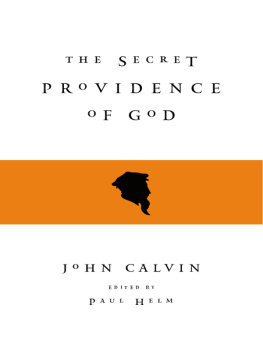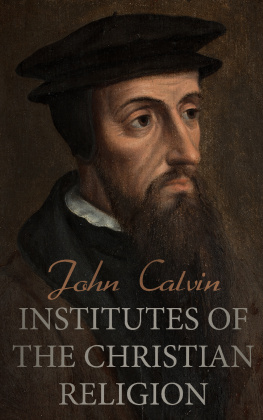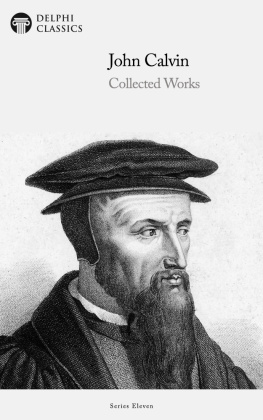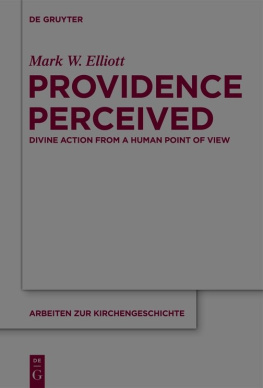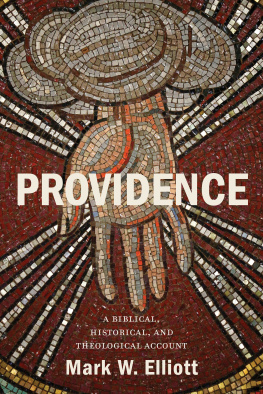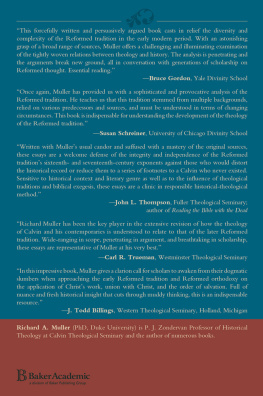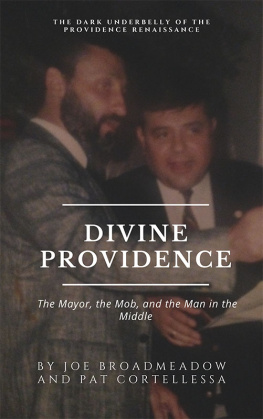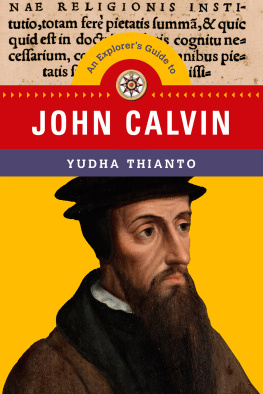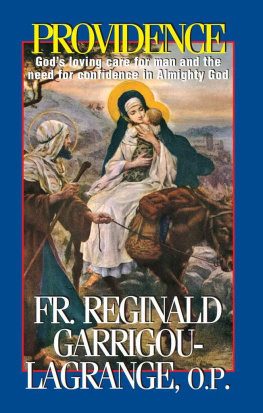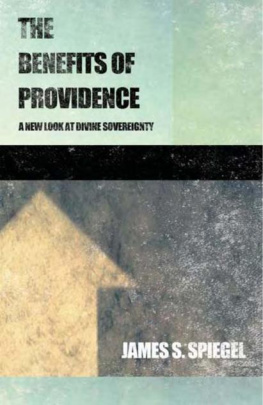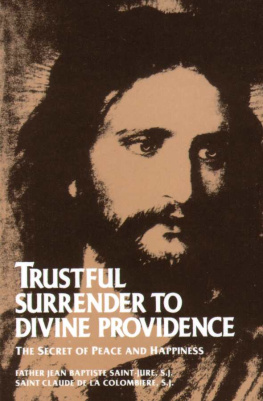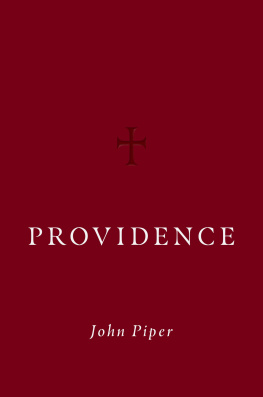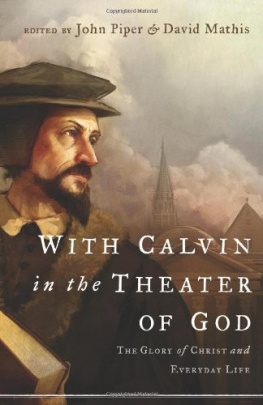Calvins robust defense of Gods providential rule of history is an excellent reminder of what was a vital concern for the French Reformer and also of his desire to be rigorously biblical and, as such, God-glorifying. Here is a pattern of theological reflection and method truly worthy of emulation.
MICHAEL A. G. HAYKIN, Professor of Church History,
Southern Baptist Theological Seminary
Calvins treatise on the secret providence of God shows the Reformer at his theological best and polemically most acute. Like Luther before him, he demonstrates why the doctrine of divine sovereignty lies at the very heart of the Reformation, and why the doctrine is of such singular doctrinal, pastoral, and ecclesiastical importance. It is to be hoped that this new edition will introduce a new generation to Calvins thinking on this vital matter.
CARL R. TRUEMAN, Academic Dean and Vice President,
Westminster Theological Seminary.

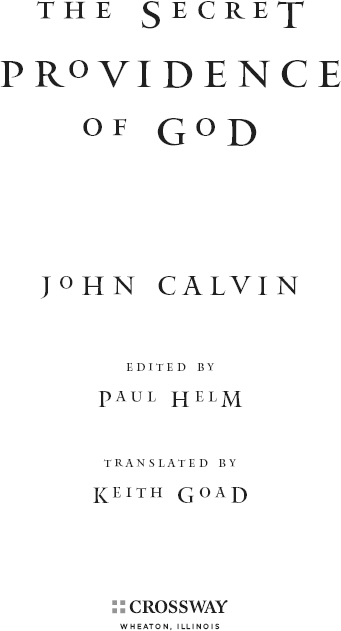
The Secret Providence of God
Copyright 2010 by Paul Helm
Published by Crossway Books
a publishing ministry of Good News Publishers
1300 Crescent Street
Wheaton, Illinois 60187
All rights reserved. No part of this publication may be reproduced, stored in a retrieval system, or transmitted in any form by any means, electronic, mechanical, photocopy, recording, or otherwise, without the prior permission of the publisher, except as provided for by USA copyright law.
Cover design: The DesignWorks Group, www.thedesignworksgroup.com
First printing 2010
Printed in the United States of America
Unless otherwise indicated, Scripture quotations are from the ESV Bible (The Holy Bible, English Standard Version), copyright 2001 by Crossway Bibles, a publishing ministry of Good News Publishers. Used by permission. All rights reserved.
Title page of Calumniae Nebulonis by John Calvin is used by permission.
Socit de lhistoire du protestantisme franais, Paris.
Trade paperback ISBN: 978-1-4335-0705-2
PDF ISBN: 978-1-4335-0706-9
Mobipocket ISBN: 978-1-4335-0707-6
ePub ISBN: 978-1-4335-2324-3
Library of Congress Cataloging-in-Publication Data
Calvin, Jean, 15091564
[Calumniae nebulonis cuiusdam, quibus odio et invidia gravare conatus est doctrinam Ioh. English]
The secret providence of God / John Calvin ; edited by Paul helm ; translated by Keith Goad.[New ed.].
p. cm.
ISBN 978-1-4335-0705-2 (tpb)
1. Providence and government of GodChristianity. I. Helm, Paul. II. Goad, Keith. III. Title
BT135.C2713 2010
231'.5dc22 2009024553
VP 19 18 17 16 15 14 13 12 11 10
13 12 11 10 9 8 7 6 5 4 3 2 1
To the Memory
of
David F. Wright
CONTENTS
Articles on Predestination Extracted from
John Calvins Latin and French Writings
These Are the Articles against Which You
Must Consider How to State Your Case
John Calvins Concerning the Secret Providence of God has the original title Calumniae nebulonis cuiusdam, quibusodio et invidia gravare conatus est doctrinam Ioh. Calvini deocculta Dei providentia. Joannis Calvini ad easdem responsio. It was published by Conrad Badius in 1558. The Latin text is found in Calvini Opera.
While we have collaborated closely throughout this project, Keith Goad is chiefly responsible for the translation and Paul Helm for the footnoting and the introduction. We have tried to produce a translation that adheres fairly literally to the original. In order to help the reader, the fourteen articles have been reproduced both in the calumniators commentary and in Calvins response. Some of the original long paragraphs have been broken up for easier reading.
Where Calvin provides a reference in the text, we have kept it there. All footnotes are our own. For Calvins quotations from Scripture we have generally used the ESV. Besides providing direct quotations from Scripture, Calvin sometimes alludes to biblical passages, and where possible the references and sometimes the texts have been supplied in the footnotes. References have also been given for Calvins various classical allusions. His references to Augustine, the only Christian author that Calvin cites, have also been given in the footnotes in those instances where they have not been provided by Calvin himself. Occasionally, translations of Augustine have also been given in the footnotes, using various translations. The authority for the references to Augustine (where Calvin himself does not provide these) is the monumental work of L. Smits, Saint Augustin dans loeuvre de Jean Calvin (2 vols.; Assen: van Gorcum, 19561957 and 1958). Smits often offers multiple sources for some allusions that Calvin makes to Augustine, but we have supplied one reference or two at the most. The full list of references or possible references can be consulted in Smits (vol. 2, 11314).
This new edition of Calvins Concerning the SecretProvidence of God could not have been prepared without help from others. Among these we particularly wish to thank Martin Cameron, Daniel Hill, Tony Lane, and Grace Mullen. Thanks as well to the Libraries of the Highland Theological College, Dingwall; the Southern Baptist Seminary, Louisville; and the Westminster Theological Seminary, Philadelphia, for various kinds of assistance.
Keith Goad and Paul Helm
vol. 9, pp. 273318.
Concerning the Secret Providence of God (1558) was Calvins third response to writings that he took to be those of a fellow Frenchman, Sebastian Castellio (1515 1563). Calvin prefaces this defense of his view of Gods providence by providing the Castellio material, which is in the form of fourteen articles, ostensibly drawn from Calvins writings, together with commentaries on each.
The two antagonists had a rather mixed relationship. Castellio met Calvin during the Reformers time in Strasbourg, and he stayed with Calvin there for a time in 1540. Initially, Calvin seems to have formed a warm attachment to him. He was impressed by his facility with languages, and during 15431544, on Calvins return to Geneva, Castellio was initially employed as rector of the College of Geneva.While in the process of seeking to become a minister he began to fall afoul of the authorities, among other things condemning the Song of Solomon as a lewd book and calling for its removal from the Canon. He also asked Calvin to be a consultant for his French translation of the Bible. Somewhat reluctantly Calvin agreed to help him. This led to quarrels over Castellios general approach to translating Holy Scripture as well as to wrangles over les mots justes, and the result was a developing mutual antipathy. Castellio resigned from the college in 1544 and later that year unsuccessfully sought work in Lausanne, taking with him a recommendation written by Calvin on behalf of the Genevan clergy. After returning to Geneva, he publicly rebuked the clergy for various alleged failings, and, as a result, he was forced to leave the city permanently. He resided in Basle, working for a time as a proofreader. There in 1551 he published his Latin Bible, dedicated to Edward VI of England, and in 1555 the French Bible (the one begun in Geneva), dedicated to Henry II of France. He was made professor of Greek at the University of Basle in 1553.
Following the execution of Michael Servetus in 1553 Castellio mounted a personal campaign against the Genevan authorities, writing De haereticis an sint persequendi
Next page
